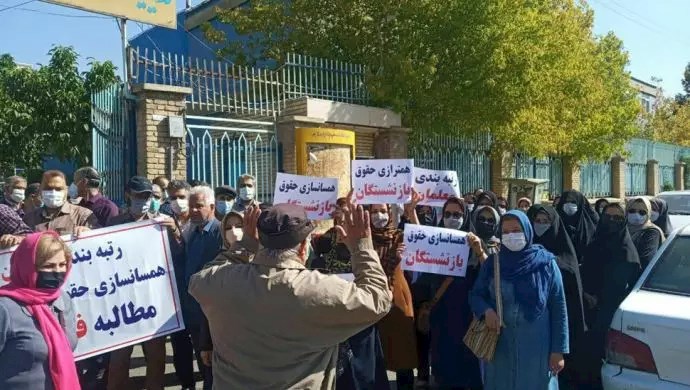Analysis by PMOI/MEK
Iran, October 18, 2021—As Iranians from all walks of life continue to hold protests in different cities across Iran, state-run media are warning about the possibility of another round of nationwide uprising.
On Sunday, the state-run Mostaghel newspaper ran a piece that discussed the critical living conditions of the Iranian people, especially those of Iran’s teachers, who have constantly been demonstrating for their most basic needs. Mostaghel warned that protests would continue if the situation does not change.
“These days, teachers’ names have been tied to livelihood problems, and we are witnessing a wave of protests by teachers in response to livelihood and living conditions problems across the country. And the government can’t overcome this crisis with band-aid responses and keeping the lid on the main demands [of the teachers],” Mostaghel wrote.
Since last year, Iran’s teachers have been raising their grievances with government officials, but the regime has refrained from addressing their demands. As the start of the academic year neared, the teachers returned to the streets to resume their protests and remind the government of its duties.
This latest round of protests has been ongoing since early September.
“The economic class gap, as well as the gap between salaries, have caused these protests and livelihood demands to become highlighted among teachers,” Mostaghel wrote in its Sunday article, then added, “Of course, these demands have not been addressed by any government, which is why the protests continue.”
The poverty line in Iran is 120 million rials (about $437 per month). Yet many teachers receive a fraction of this sum.
And Iranian teachers receive their salary with a delay. Some informal teachers are only receiving half their wages. The authorities’ answer to the teachers’ protests is negligence and then oppression.
Many teachers have committed suicide in recent years due to poverty and not being able to provide for their basic needs.
“In a society where the poverty line is 120 million rials, and the average income is 60 million rials [per month], all teachers are under the poverty line, and this is why they continue their protests,” Mostaghel wrote.
Interestingly, the piece also admits that the regime’s response to suppress protests will not solve any problem. In the past month, security forces have cracked down on the teachers’ protest rallies on several occasions, beating and arresting demonstrators. But the protests continue, and in addition to their economic demands, the teachers are now also chanting slogans to release imprisoned teachers.
“The security apparatus tries to stop the protests through pressure, but so long as livelihood problems are not solved, we will continue to see these protest rallies,” Mostaghel warned.
In another piece on Monday, Mostaghel warned about the implications of growing poverty and unemployment and wrote, “We must prevent the apparition of phenomena such as the rebellion of the unemployed and the hungry.”
In the article, Mostaghel warned about the widening gap between the ruling elite and ordinary Iranians.
“The shrinking of Iran’s economic capacity and the resulting unemployment and inflation and by extension the shrinking of the people’s tablecloths should be a warning sign for the country’s economic and political authorities,” Mostaghel wrote. “In circumstances that the country’s production is in its weakest condition, a large part of the liquidity has been channeled into profiteering from currency and coin exchange, and many workers have lost their jobs, should a small group of people live in extreme luxury?”
Alluding to the November 2019 protests, a nationwide uprising that brought the regime on the verge of downfall, Mostaghel writes, “Even the incidents of November did not cause a change to the governance or reforms in the country’s economic system… The tolerance threshold of the youth and the impoverished segments of society is limited. When that threshold is reached, these people have no reason to remain silent and will react.
“The news about social problems, and the shrinking of the people’s tablecloth, and the disappearance of items such as meat and poultry from their meals is a countdown and an alarm.”





